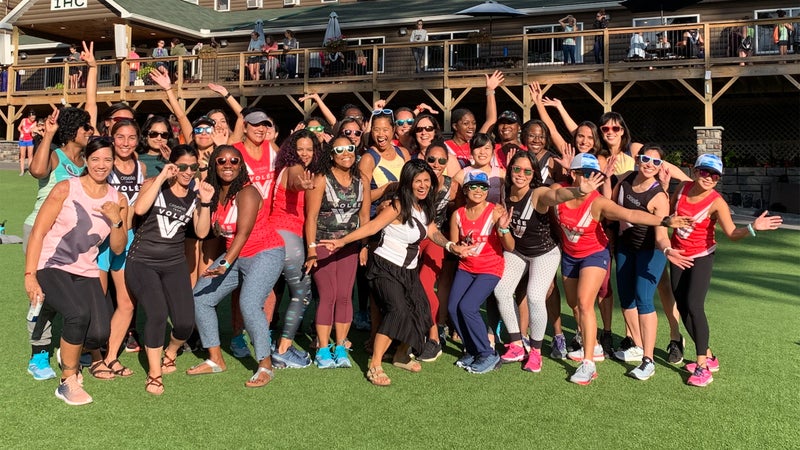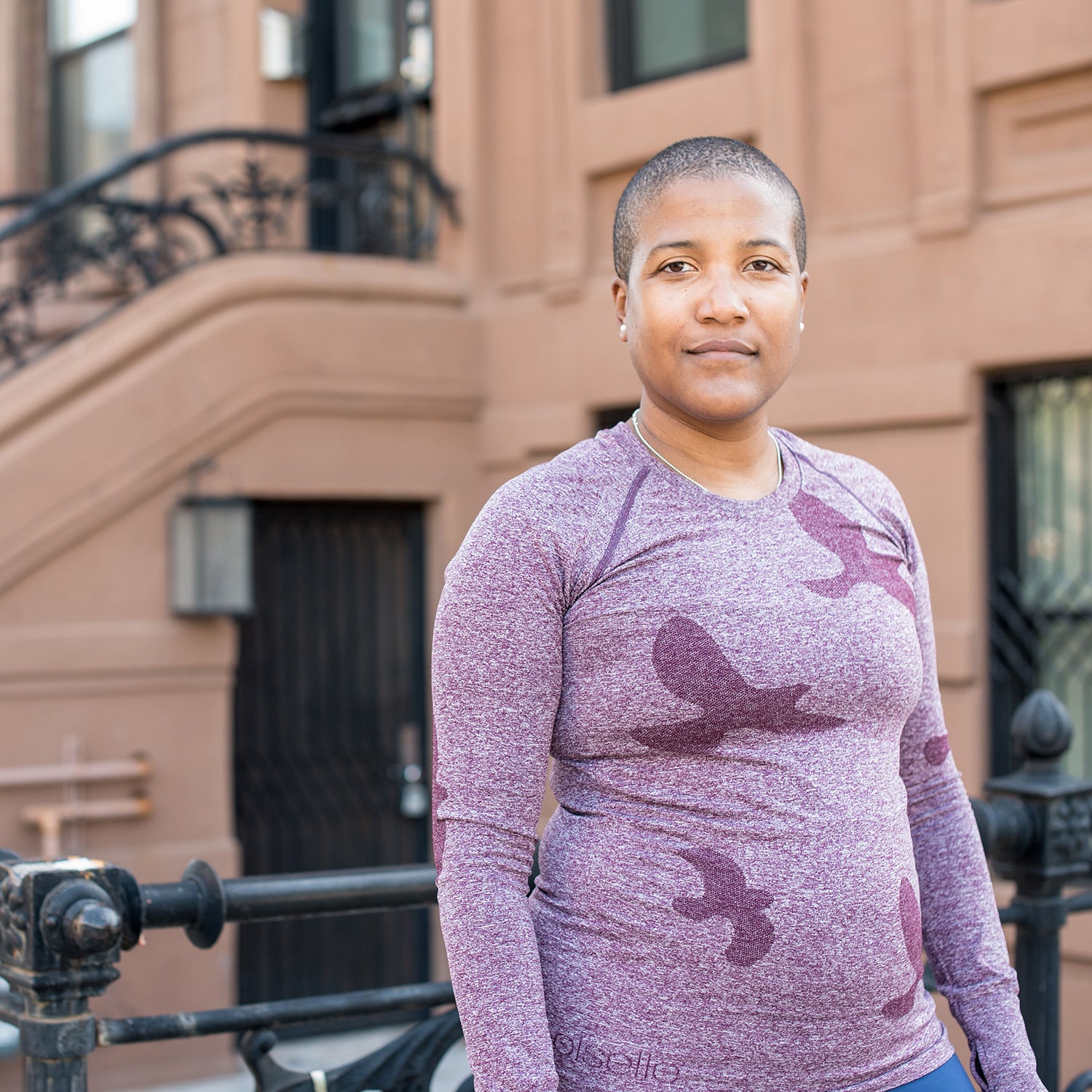░┬┤ă│ż▒▓ďÔÇÖs running-apparel company Oiselle announced today that has as an athlete-adviser. D├ęsir╠řis the founder of the running group Harlem Run and the running advocacy organizations Run 4 All Women and Global Womxn Run Collective. She recently called out the running community for its racism and lack of coverage╠řfollowing the news of Black runner Ahmaud ArberyÔÇÖs murderÔÇöfirst on Instagram, then in an essay for ║┌┴¤│ď╣¤═°. , the director of diversity and inclusion at a Washington, D.C., law firm and a marathoner, has also joined the company as an adviser on diversity, equity, and inclusion.
D├ęsir founded Harlem Run in 2013 to create a space for Black runners to feel welcome in the running community. After the 2016 presidential election, she led a four-women relay run from Harlem to Washington, D.C., to join the ░┬┤ă│ż▒▓ďÔÇÖs March, raising more than $100,000 for Planned Parenthood along the way. D├ęsir is also a mental-health coach, and sheÔÇÖs currently leading on the intersection of race, mental health, and fitness.
One component of D├ęsirÔÇÖs role will be brand ambassador: sheÔÇÖll wear Oiselle apparel and represent the brand at events, though Hoka remains her shoe sponsor. Elite runner Kara Goucher and former professional runner Lauren Fleshman have held╠řsimilar roles at the company for the past several years. (Fleshman also coaches an arm of OiselleÔÇÖs elite team.)╠řAnd like Goucher and Fleshman, D├ęsir will help design her╠řown apparel lineÔÇösheÔÇÖs starting with socksÔÇöand receive royalties from purchases. All three women will serve as athlete-advisers, a new title at the company. (Goucher╠řand Fleshman have had input on OiselleÔÇÖs activities╠řand products since they joined the company in 2013 and 2014, respectively. The new title formalizes their leadership positions.) As a Black woman, D├ęsir says she brings a different lived experience and perspective to the brand than her white teammates.
As part of the hiring process, D├ęsir and Oiselle founder and CEO Sally Bergesen╠řhad a frank conversation about her role. ÔÇťShe was clear that I was not the token Black woman and that it was not my responsibility to tell her every time there is a race problem in Oiselle,ÔÇŁ D├ęsir says. D├ęsir and Bergesen began getting to know each other over social media two years ago and met in person last year during New York City Marathon weekend. At the time, D├ęsir had recently formed the╠ř, a group whose mission was to ÔÇťdisrupt the status quo of the male-dominated running industry.ÔÇŁ (The spelling of womxn,╠ř, is designed to be inclusive╠řof all people who identify as women.)╠řThe goal resonated with╠řBergesen, who leads the brand with a strong, feminist bent. Bergesen went to D├ęsirÔÇÖs meetup before the marathon,╠řand the relationship grew from there into an ÔÇťorganic aligningÔÇŁ on activism, social justice, and inclusive values, D├ęsir says.
Another element of D├ęsirÔÇÖs role will be participating in the new advisory group Bergesen is creating to bring more diverse voices to╠řthe top of the brand. In addition to Carter, Goucher, and Fleshman, the 11-person committee╠řwill also include: , the founder of the ad agency Copacino + Fujikado; Michael Volz, BergesenÔÇÖs sibling╠řand a member of the LGTBQ+ community; and Oiselle president Atsuko Tamura, who joined the company in 2015.
The group will have input on all aspects of the company, including brand and marketing strategy, the growth of the elite and community teams, and product development. ÔÇťAs a white woman, IÔÇÖve had the growing realization that we need more diverse voices at our table,ÔÇŁ Bergesen says of the decision to form the committee. ÔÇťThose voices should be part of shaping business strategy and growth. Otherwise itÔÇÖs just performative allyship.ÔÇŁ
As members of the new╠řadvisory group, Carter╠řand D├ęsir believe the committee╠řis an important step in addressing racism. ÔÇťOur life experiences inherently limit what we know,ÔÇŁ D├ęsir says. ÔÇťThe more diversity we have, as it relates to race, gender, and beliefs, the [fewer]╠řblind spots we have.ÔÇŁ In her role, Carter will advise the brand on inclusive leadershipÔÇöboth broadly among the brandÔÇÖs top executives╠řand specifically to the women who lead OiselleÔÇÖs community team, known as Vol├ęe. Vol├ęe is open to anyone and currently includes 4,000 women across the globe╠řas part of an online community that also hosts local meetups and events.
Hiring D├ęsir and Carter in the middle of a╠řnational╠řreckoning on race was intentional, but not as reactionary as it might seem. Oiselle began a conscious effort to diversify both its elite and community teams back in 2011, not just around race, but also in terms of class, education, culture, and gender identity. Over the past four years, the brand has signed a number of women of color to its (six out of the 16 current track and field athletes are women of color) and worked to attract more Black and Brown╠řwomen to the Vol├ęe team.
Carter has been at the forefront of the latter effort. When she joined Vol├ęe╠řin 2013, she was one of a handful of women of color out of roughly 100 members across the country. In order to attract more women of color to the team, Carter began regularly posting photos of herself and other members of╠řVol├ęe on social media. Women of color reached out to ask about the group, and membership among Black and Brown╠řwomen gradually grew. ÔÇťMore diversity comes from more diversity,ÔÇŁ she says. ÔÇťWhen you see people who look like you, you think, OK, this is for me.ÔÇŁ
In 2018, Oiselle began hosting Big Birdcamp, a weekend-long running retreat for Vol├ęe members. At a photo shoot, participants╠řwere breaking off into subgroupsÔÇörunners from the same region, runners who trained with the same coach. Carter asked for a shot of all the women of color present. ÔÇťIt was a fairly large group,ÔÇŁ Carter says, estimating there were around 30 women. ÔÇťThat was cool to see.ÔÇŁ

The following year, Carter approached Oiselle about carving out space for women of color to meet separately at camp. Oiselle provided a room and put the meeting on the schedule. It proved an important development. ÔÇťIt gave us space to be frank and honest about shared experiences,ÔÇŁ Carter says. After that╠řshe started a private Facebook group for Vol├ęe women of color, a forum she equates to affinity groups at other companies. ÔÇťFor a lot of people, these spaces are a place you can breathe,ÔÇŁ she says, explaining that individual Black people often feel pressure to represent all Black people, which can affect how they present themselves to others. ItÔÇÖs a relief, she says, to have a place where Black people can just be themselves.
She adds that she feels ÔÇťheard at Oiselle, but not all women of color do.ÔÇŁ She cites the experience of one Black member who said she joined her white teammates one morning at camp and felt like she wasnÔÇÖt seen, a sentiment that is often expressed by women of color. (Aliphine Tuliamuk, who won the U.S. Olympic Marathon Trials in February, recently that she felt invisible after winning the trials because much of the press coverage focused on the white women racing. Carter called out this bias in .)
Carter is quick to point out that creating inclusive spaces must be deliberate. She says╠řthat the typical model for running and outdoor brands has been: build it and hope everyone comes. But if you want to create a diverse community, you have to begin with the end user in mind, she╠řsays. Hats are an example: her afro doesnÔÇÖt fit under most running caps. Black women with natural hair need a visor. Details like these may seem small, but they carry huge emotional weight. ÔÇťHaving these options can signal, Hey, you belong here,ÔÇŁ Carter says. ÔÇťWithout them, the message is not only do you not belong, but we havenÔÇÖt thought about how you might fit in.ÔÇŁ╠ř(Bergesen says that the visor Oiselle now sells on its site is the result of CarterÔÇÖs feedback.)
Carter will be facilitating a conversation about race and bias among Vol├ęeÔÇÖs 4,000 members. SheÔÇÖs still in the early planning stages, but she hopes the teamÔÇÖs white members will do personal work around their own biases, privilege,╠řand racism. (Oiselle does not currently track the demographics of its 4,000 Vol├ęe members. But after conferring with a few women of color on the team, the company plans to do a survey as part of its diversity effort.)
Carter and D├ęsir╠řbelieve that in order to address racism in the running community, brands must be part of the solution. D├ęsir says that people are, justifiably, turning to╠řcompanies╠řright now to demand╠řlong-term commitment to equity and social change. (As Fleshman puts it: ÔÇťWe all love running╠řand want brands to do more than sell us shit.ÔÇŁ) Brands help shape culture, and they can either evolve into diverse spaces or continue to perpetuate systemic racism. Oiselle is still predominantly white, Carter says, but the brand is putting the structure and people in place that can lead to change.
Both Carter and D├ęsir╠řhope that the current conversations on race happening in the running spaceÔÇösuch as that have ╠řand panel discussions like , on systemic racism in runningÔÇömove from discussion to action. To effectively address systemic racism, brands need to bring more diverse people into all parts of their organizations,╠řfrom employees to leadership, Carter says.
ÔÇťBlack womxn╠řare always critical leaders in all spaces,ÔÇŁ D├ęsir added in an email. ÔÇťItÔÇÖs important the workplace is ready for diverse leadership. That is, it is welcoming and not hostile, and that Black women are part of the companyÔÇÖs transformation and commitment to equity.ÔÇŁ


